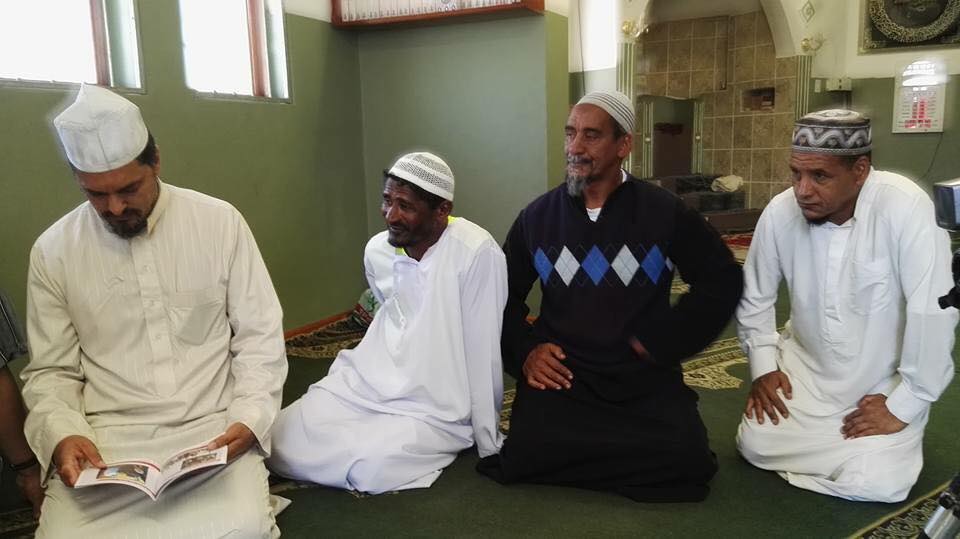Awqaf South Africa embarked on a three day masjid tour where the organisation visited 22 Islamic institutions in the emerging communities of Cape Town. The aim of the visit was to meet with the imams of these institutions and to assess their needs and conditions of how they operate – and to get a broader understanding of the dynamics of the communities.
A member of the Al-Kauthar Institute, Shaykh Bilal Ismail was the frontrunner of the tour and assisted in evaluating the level of support that these Islamic institutions and mosques require.
The initiative forms part of the Imam Development Programme (IDP), which is a programme that aims to assist currently employed imams and religious leaders to empower, develop and refine their skills.
In addition, the programme looks at improving the infrastructure, social and financial conditions of various mosques and Islamic Institutions – and supports imams to become better leaders
Shaykh Bilal Ismail says that many imams are compensated with a relatively low salary and they conduct their jobs with limited resources.
“The IDP aims to assist employed imams. The programme provides them the tools to execute their jobs better. We have many imams in this country who earns a low salary, lacks in self-confidence, who is unable to go to the book shops and buy whichever books he wants. Many times these imams don’t even have a vehicle and operate with no internet access. Some of these imams don’t even own a smartphone, yet we expect them to deliver a beautiful khutbah,” he said.
“We want these imams to be aware of what’s happening around the world, we want them to connect with the youth, but unfortunately, they don’t have the ability to attain all of that. They are paid a low salary,” he says.
Shaykh Bilal Ismail is very passionate about working with Awqaf on the IDP and changing the poor conditions of imams and Islamic institutions.
“The IDP aims to support every single working imam, after the employer gives permission for these imams to be part of the project. We offer them a $5000 package – $200 in their bank account every month, that’s $2400 for the entire year and then $2600 in kind. This includes medical assistance, a laptop with internet access, a smartphone and good clothing, so that when he stands, he is confident and speaks with confidence,” he explained.
All the imams on the IDP are required to submit a two page progress report every month. Every two months, there is a small competition between the imams, where the best imam for the past two months gets something extra.
The project has been developed in such a way that the more active the imam becomes, the more rewards he will get.
“We also try to organise a Hajj trip for the best imam of the year or we try to secure scholarships for his children at university or high schools,” he says.
Rahmaniyyah masjid leader, Imam Fudhal Jones, a benefactor of the programme, notes the various issues faced in his community. Moreover, he addresses the issue of why development is essential for the progression of an emerging community. He also touches on the lurking question of how do mosques and imams generate their income.
“Gangsterism is the main social issue and we have a very huge drug problem in Steenberg. The drug problem leads to abuse in houses, teen pregnancies and poverty. From a spiritual perspective, the spirit and motivation of the community is rather down and it’s something we need to work on. If we want to progress, we need to have some level of development,” he said.
“Our main source of income is from the executive committee that holds functions. Jumu’ah doesn’t bring in big money, but functions and donors contribute the most. The executive then uses those funds to pay the employers,” he continued.
Deputy Imam of Masjid Sabr, Ismail Toufie describes the negative social issues faced in his community, highlighting gangsterism, admitting that a significant amount of gang affiliates are in fact, Muslim.
However, he says that the social issues in the vicinity of the masjid, does not affect the daily operations of the mosque.
He also says that imams do not get to enjoy the financial benefits such as, UIF and pension fund contribution, like those in conventional jobs.
“The main social issue is gangsterism and the obvious other ones are the drugs and teen pregnancies. There are various groups in the area who’s trying to combat these issues.”
“There is a significant amount of Muslims who are victims of these social issues. These social issues do not hinder the mosque from carrying on with its daily activities. Everything is well in order for people who want to come to the masjid. The mosque is easily accessible and the vicinity of the mosque is quite safe,” he says. VOC (Ra-ees Moerat)






 WhatsApp us
WhatsApp us 

